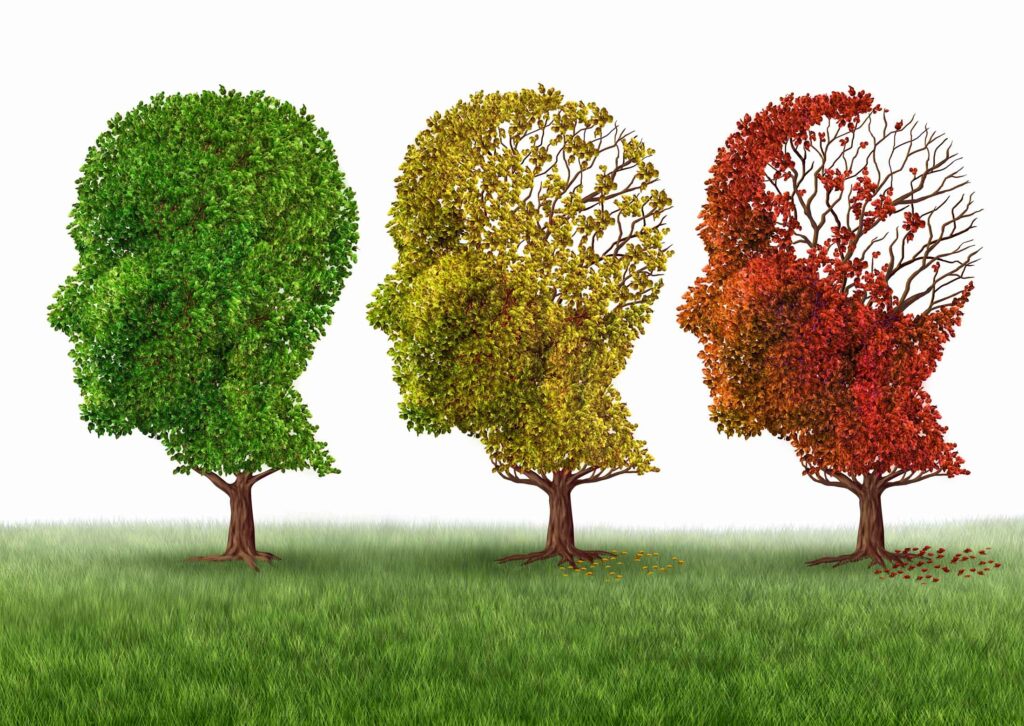Our clinic specializes in
Treating Dementia with Functional Medicine
Dementia is a general term for a loss of mental ability that has progressed to a point where it interferes with a person’s daily life and activity. Various areas of cognitive function can be affected including memory, executive function, language, and visuospatial ability. There are different types of dementia and most are progressive meaning they worsen over time.
Alzheimer’s disease is the most common form of dementia accounting for 60% to 80% of dementia cases. There are currently more than 6 million Americans living with dementia. Alzheimer’s Dementia is a huge health concern. It is a terminal illness resulting in progressive loss of mental ability and eventually death. In 2019 it was ranked the 5th leading cause of death among individuals age 65 and older. It kills more people than breast cancer and prostate cancer combined.
The biggest risk factor for Alzheimer’s dementia is age. It affects 5% of people ages 65-74, 13.1% of people ages 75-84, and 33.3% of people 85 and older. For most sufferers of Alzheimer’s disease, the symptoms first appear in their mid-60s.
Genetics also play a role in Alzheimer’s disease risk. Of these genes, the ApoE gene has the strongest impact on the risk of developing late-onset Alzheimer’s dementia. There are 3 forms of the ApoE gene, ApoE2, ApoE3, and ApoE4. Everyone inherits one of these ApoE genes from their mother and one from their father. The most common genetic makeup for people in the United States is ApoE3/E3 (one E3 from their mother and one from their father). The ApoE3 gene has a neutral effect on the risk of developing Alzheimer’s. However, if you have one copy of the ApoE4 gene your risk of Alzheimer’s increases by 3x compared to a person who has ApoE3/E3. If you have 2 copies of the ApoE4 gene then your risk increases by 8-12x compared to a person who has ApoE3/E3.
Short-term memory loss is the first thing affected in the common, amnestic, form of Alzheimer’s dementia. This leads to symptoms such as repeating stories, forgetting words or names, misplacing items, getting lost, and having difficulty with time/scheduling. Some people begin with a non-amnestic presentation. They initially have more issues with calculations, judging distances, trouble reading, and difficulty recognizing objects or faces.
In Alzheimer’s disease neurons die leading to loss of brain tissue; atrophy. This cell death occurs in different areas of the brain but is usually seen in the temporal lobes which are essential for memory. The hippocampus or memory center is located in the temporal lobes of the brain. As the disease progresses there is an accumulation of beta-amyloid protein outside of/between the brain cells (neurons) and tangles of tau protein inside of the neurons. However, it is unclear if these proteins are at least partly responsible for the neuronal damage or if they are simply the result of nerve cell damage.
We still do not have any drugs that can stop or reverse the progression of Alzheimer’s disease. The few medications we so have have only been shown to have a modest effect on slowing the disease progression. Research has focused on drugs to remove beta-amyloid protein from the brain and despite success in doing so, they have yet to greatly impact the disease.

Alzheimer’s disease exists on a continuum.
1) First there is the preclinical phase. During this time the person has no symptoms but pathological brain changes are occurring. We have new blood tests such as the p-tau 181, p-tau 217, and amyloid 42:40 ratio that can pick up these biological brain changes 4-5 years before any cognitive symptoms appear.
2) As cognitive issues begin to appear one enters the next phase of subjective cognitive impairment. In this phase, they begin to notice their cognition is declining but not to a degree that others notice and if they do cognitive testing they will score normally.
3) The next stage is mild cognitive impairment. During this stage the person will have more significant cognitive and memory issues but not where it impacts their everyday activity. Family members and close friends will likely notice some cognitive issues and they will score abnormally on cognitive testing.
4, 5, and 6) The last 3 stages are Mild Alzheimer’s Dementia, Moderate Alzheimer’s Dementia, and Severe Alzheimer’s Dementia. Cognitive symptoms now begin to affect everyday activities. As the disease process worsens the ability to perform daily activity declines.
New research from Dr. Dale Bredesen shows that there are multiple causes of Alzheimer’s disease. Each person will have unique contributors to his or her dementia. If we can identify and treat as many of these causes as possible then we can not only stop disease progression, but we can even reverse the disease process. This is especially true the earlier you begin to intervene.
Dr. Dan LaPerriere has had extensive training and experience in using the teachings of Dr. Dale Bredesen (the ReCODE Protocol). He helps people identify what the main contributors are to their dementia and helps develop a plan to intervene and help restore healthy brain function.
There are other types of dementia and a person may have more than one type of dementia affecting their brain. Some of the other forms of dementia include vascular dementia, lew-body dementia, and frontotemporal dementia. At this point, we do not have the evidence to say that the ReCODE protocol can stop and reverse these other forms of dementia. However, the principles may provide some help and are not going to hurt.


